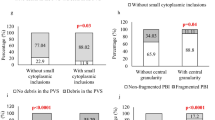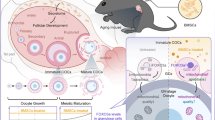Abstract
The effect of recombinant human chorionic gonadotropin (hCG) at pregnancy-appropriate concentrations (10 and 100 IU/mL) on differentiation and functional activity of myeloid-derived suppressor cells (MDSCs) was studied. The object of the study was isolated CD11b+ cells that were converted to the MDSC phenotype by two-step activation with GM-CSF cytokines, IL1β and lipopolysaccharide (LPS). After a week of cultivation, the total MDSC level was determined considering the subpopulations M-MDSC and PMN-MDSC, the expression of arginase-1 (Arg1) and indoleamn-2,3-dioxydiogenase (IDO) in these cells, as well as the cytokine profile in cell culture supernatant. It was shown that hCG increased the total number of MDSCs, and its lower concentration (10 IU/mL) contributed to the differentiation of the M-MDSC subpopulation. hCG did not affect the expression of IDO expression in MDSCs, but there was a tendency to increase IDO expression under the influence of hCG at a concentration of 10 IU/mL. CD11b+ cells converted to the MDSC phenotype had a low Arg 1 content, making it impossible to evaluate the effect of the hormone on the expression of this enzyme. Evaluation of the cytokine profile by multiplex analysis showed that hCG did not modulate cytokine production in the culture of CD11b+ cells converted the MDSC phenotype. This is the first time that hCG has been shown to induce differentiation of MDSCs.



Similar content being viewed by others
REFERENCES
Lutz M. B. Eckert I. N. 2021. Comments on the ambiguity of selected surface markers, signaling pathways and omics profiles hampering the identification of myeloid-derived suppressor cells. Cell. Immunol. 364, 104347. https://doi.org/10.1016/j.cellimm.2021.104347
Köstlin N., Kugel H., Spring B. Leiber A., Marmé A., Henes M., Rieber N., Hartl D., Poets C. F., C. Gille. 2014. Granulocytic myeloid derived suppressor cells expand in human pregnancy and modulate T-cell responses: Cellular immune response. Eur. J. Immunol. 44 (9), 2582–2591. https://doi.org/10.1002/eji.201344200
Ponomarev A.V. 2016. Myeloid-derived suppressor cells: general characteristics. Immunologiya (Rus.). 37 (1), 47–50. https://doi.org/10.18821/0206-4952-2016-37-1-47-50
Ostrand-Rosenberg S. 2018. Myeloid derived-suppressor cells: Their role in cancer and obesity. Curr. Opin. Immunol. 51, 68–75. https://doi.org/10.1016/j.coi.2018.03.007
Kumar V. Patel S., Tcyganov E., Gabrilovich D. 2016. The Nature of myeloid-derived suppressor cells in the tumor microenvironment. Trend. Immunol. 37, 208–220. https://doi.org/10.1016/j.it.2016.01.004
Nair R.R., Sinha P., Khanna A., Singh K. 2015. Reduced myeloid-derived suppressor cells in the blood and endometrium is associated with early miscarriage. Am. J. Reprod. Immunol. 73 (6), 479–486. https://doi.org/10.1111/aji.1235
Kharchenko E.P. 2011. Tolerance of mother and fetus as a manifestation of the regulatory continuum and plasticity of their immune systems. Meditsinskaya immunologiya (Rus.). 13 (2–3), 121–132. https://doi.org/10.15789/1563-0625-2011-2-3-121-132
Paulesu L., Rao C.V., Ietta F., Pietropolli A., Ticconi C. 2018. hCG and Its disruption by environmental contaminants during human pregnancy. Int. J. Mol. Sci. 19 (3), 914. https://doi.org/10.3390/ijms19030914
Giaglis S., Stoikou M., Grimolizzi F., Subramanian B. Y., Shane V. B., Hoesli I., Lapaire O., Hasler P., Than N.G., Hahn S. Neutrophil migration into the placenta: Good, bad or deadly? Cell Adh. Migr. 10 (1–2), 208–225. https://doi.org/10.1080/19336918.2016.1148866
Hahn S. Giaglis S., Hoesli I. Hasler P. 2012. Neutrophil NETs in reproduction: From infertility to preeclampsia and the possibility of fetal loss. Front. Immunol. 3, 362. https://doi.org/10.3389/fimmu.2012.00362
Rami D., La Bianca C. Zauli G., Radillo O., Bulla R. 2014. The first trimester gravid serum regulates procalcitonin expression in human macrophages skewing their phenotype in vitro. Mediators Inflam. 2014. 1–10. https://doi.org/10.1155/2014/248963
Furcron A., Romero R., Mial T. N., et al. 2016. Human chorionic conadotropin has anti-inflammatory effects at the maternal-fetal interface and prevents endotoxin-induced preterm birth, but causes dystocia and fetal compromise in mice. Biol. Reprod. 94 (6), 1–13. https://doi.org/10.1095/biolreprod.116.139345
Gaynor L.M., Colucci F. 2017. Uterine natural killer cells: Functional distinctions and influence on pregnancy in humans and mice. Front. Immunol. 8, 467. https://doi.org/10.3389/fimmu.2017.00467
Tsampalas M., Gridelet V., Berndt S. Foidart J-M., Geenen V., Hauterive S.P. 2010. Human chorionic gonadotropin: A hormone with immunological and angiogenic properties. J. Reprod. Immunol. 85 (1), 93–98. https://doi.org/10.1016/j.jri.2009.11.008
Zamorina S.A., Shirshev S.V. 2013. Human chorionic gonadotropin is a factor in the induction of immune tolerance during pregnancy. Immunologia (Rus.). 34 (2), 105–107.
Zamorina S.A., Shardina K.Yu., Timganova V.P., Bochkova M.S., Uzhviyuk S.V., Raev M.B., Chereshnev V.A. 2021. The effect of alpha-fetoprotein on the differentiation of myeloid-derived suppressor cells. Doklady Akademii Nauk (Rus.). 501 (1), 569–572. https://doi.org/10.31857/S2686738921060184
Cole L.A. 2012. hCG, the wonder of today’s science. Reprod. Biol. Endocrinol. 10 (1), 24. https://doi.org/10.1186/1477-7827-10-24
Hu C., Zhen Y., Pang B., Lin X., Yi H. 2019. Myeloid-derived suppressor cells are regulated by estradiol and are a predictive marker for IVF outcome. Front. Endocrinol. (Lausanne). 10, 521. https://doi.org/10.3389/fendo.2019.00521
Pan T., Zhong L., Wu S., Cao Y., Yang Q., Cai Z., Cai X., Zhao W., Ma N, Zhang W. 2016. 17β-Oestradiol enhances the expansion and activation of myeloid-derived suppressor cells via signal transducer and activator of transcription (STAT)-3 signalling in human pregnancy. Clin. Exp. Immunol. 185 (1), 86–97.
Fallarino F., Grohmann U., Bianchi V.C.R., Orabona C., Spreca A., Fioretti M.C., Puccetti P. 2002. T cell apoptosis by tryptophan catabolism. Cell Death Differ. 9 (10), 1069–1077. https://doi.org/10.1038/sj.cdd.4401073
Fletcher M., Ramirez M., Sierra R.A., Raber P., Thevenot P., Khami A.A., Sanchez-Pino D., Hernandez C., Wyczechowska D.D., Ochoa A.C., Rodriguez P.C. 2015. l-Arginine depletion blunts antitumor T-cell responses by inducing myeloid-derived suppressor cells. Cancer Res. 75 (2), 275–283. https://doi.org/10.1158/0008-5472.CAN-14-1491
Bansal V., Ochoa J.B. 2003. Arginine availability, arginase, and the immune response. Curr. Opin. Clin. Nutr. Metab. Care. 6, 223–228. https://doi.org/10.1097/00075197-200303000-00012
Cook P.C., Jones L.H., Jenkins S.J., Wynn T. A., Allen J.E., MacDonald A. S. 2012. Alternatively activated dendritic cells regulate CD4+ T-cell polarization in vitro and in vivo. Proc. Natl. Acad. Sci. USA. 109, 9977–9982. https://doi.org/10.1073/pnas.1121231109
Bronte V., Cingarlini S., Apolloni E., Serafini P., Marigo I., De Santo C., Macino B., Marin O., Zanovello P. 2003. Effective genetic vaccination with a widely shared endogenous retroviral tumor antigen requires CD40 stimulation during tumor rejection phase. J. Immunol. 171, 6396–6405.
Bian Z., Abdelaal A.M., Shi L., Liang H., Xiong L., Kidder K., Venkataramani M., Culpepper C., Zen K., Liu Y. 2018. Arginase-1 is neither constitutively expressed in nor required for myeloid-derived suppressor cell-mediated inhibition of T-cell proliferation. Eur. J. Immunol. 48 (6), 1046–1058. https://doi.org/10.1002/eji.201747355
Saito S. Nakashima A., Shima T. Mika I. 2010. Th1/Th2/Th17 and regulatory T-cell paradigm in pregnancy. Am. J. Reprod. Immunol. 63 (6), 601–610. https://doi.org/10.1111/j.1600-0897.2010.00852
Mauti L.A., Le Bitoux M., Baumer K. 2011. Myeloid-derived suppressor cells are implicated in regulating permissiveness for tumor metastasis during mouse gestation. J. Clin. Invest. 121 (7), 2794–2807. https://doi.org/10.1172/JCI41936
Underwood J.L., Ruszkiewicz M., Barnden K.L. 1985. Does antigenic modulation cause the absence of major histocompatibility complex antigens on the syncytiotrophoblast? Transplant. Proc. 17, 921–924.
Timganova V.P., Shardina, K.Yu., Bochkova M.S., Uzhviyuk S.V., Usanina D.I., Zamorina S.A. 2023. The effect of troblastic β1-glycoprotein on the differentiation of myeloid-derived suppressor cell. Meditsinskaya immunologiya (Rus.). 25 (3), 1179–1186. https://doi.org/10.15789/1563-0625-EOP-2838
Zamorina S.A., Timganova V.P., Bochkova M.S., Shadrina K.Yu., Uzhviyuk S.V., Khramtsov P.V., Kropaneva M.D., Raev M.B. 2021. The role of glycodelin in the regulation of differentiation of myeloid-derived suppressor cells. Meditsinskaya immunologiya (Rus.). 23 (4), 641–646. https://doi.org/10.15789/1563-0625-ROG-2209
Shardina K.Yu., Zamorina S.A., Timganova V.P., Bochkova M.S., Uzhviyuk S.V., Chereshnev V.A. 2023. Alpha-fetoprotein as a factor of differentiation and functional activity of myeloid-derived suppressor cells. Kletochnye tekhnilogii v biologii i meditsine (Rus.). (In print).
Shardina K.Yu., Zamorina S.A., Raev M.B., Chereshnev V.A. 2022. The role of myeloid-derived suppressor cells in the formation of immune tolerance during pregnancy. Tsitologiya (Rus.). 64 (2), 116. https://doi.org/10.31857/S0041377122020067
Funding
The work was supported by the Russian Foundation for Basic Research (project no. 19-415-590001) and within the framework of R&D AAAA19-119112290007-7.
Author information
Authors and Affiliations
Corresponding author
Ethics declarations
The authors state that they have no conflict of interest.
The study was conducted in accordance with the Helsinki Declaration of the BMA 2000 and the Protocol of the Council of Europe Convention on Human Rights and Biomedicine 1999. Permission was obtained from the Ethical Committee of the IEGM of the Ural Branch of the Russian Academy of Sciences (IRB00010009) of August 18, 2020.
Additional information
Translated by E. Puchkov
Publisher’s Note.
Pleiades Publishing remains neutral with regard to jurisdictional claims in published maps and institutional affiliations.
Rights and permissions
About this article
Cite this article
Shardina, K.Y., Timganova, V.P., Bochkova, M.S. et al. Effects of Human Chorionic Gonadotropin on Differentiation and Functional Activity of Myeloid-Derived Suppressor Cells. Biochem. Moscow Suppl. Ser. A 17, 332–339 (2023). https://doi.org/10.1134/S1990747823050094
Received:
Revised:
Accepted:
Published:
Issue Date:
DOI: https://doi.org/10.1134/S1990747823050094




